Peer into the celestial realm to uncover the enigmatic power of angels in the Bible, their divine missions, and mysterious boundaries.
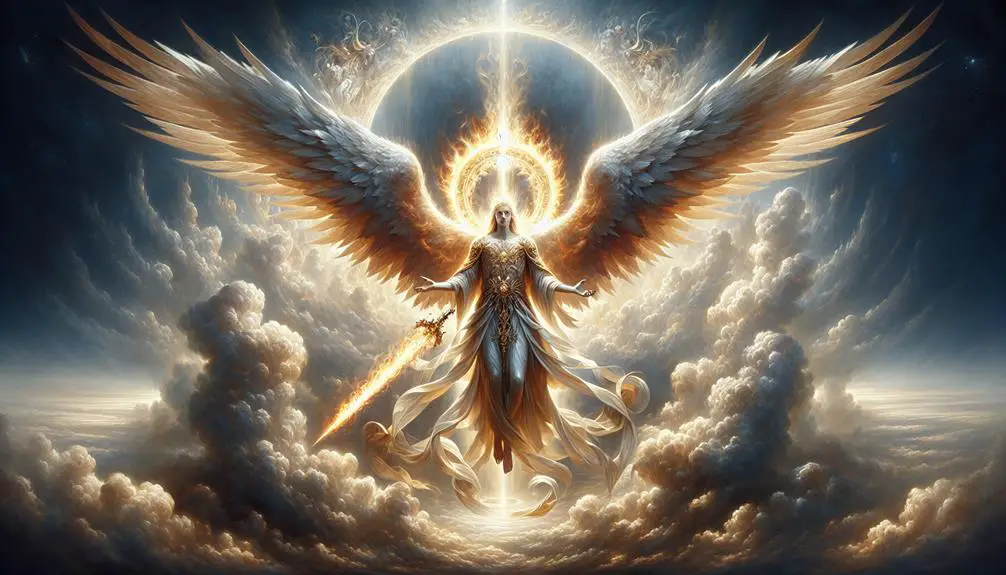
How Powerful Are Angels in the Bible
Did you know that angels are mentioned over 300 times in the Bible?
You've probably heard tales of their incredible power and divine missions, from guarding the Garden of Eden with a flaming sword to wrestling with Jacob until dawn.
Their appearances and acts weave through the fabric of biblical narratives, showcasing a blend of awe-inspiring strength and profound messages.
Yet, the true extent of their power, how it's wielded, and the boundaries within which they operate remain shrouded in mystery.
Uncovering these aspects will offer you a fascinating insight into the celestial workings that influence both heaven and earth.
Key Takeaways
- Angels possess exceptional strength, serving as formidable warriors in spiritual battles.
- They are capable of miraculous interventions, marking pivotal moments in biblical narratives.
- Their power is subject to divine will, with limitations on human interaction.
- Guardian angels provide protection and guidance, reflecting their multifaceted roles beyond traditional myths.
Angelic Nature and Origins

Angels, as depicted in the Bible, are celestial beings created by God, whose essence and purpose transcend human understanding and the physical realm. They're not only remarkable for their angelic creation but also for their celestial duties, which encompass serving as messengers, protectors, and executors of God's will. Their nature, while shrouded in mystery, is consistently associated with purity and obedience to the divine. Unlike humans, they're not burdened by physical needs or mortal sins, which positions them as unique entities within the biblical narrative.
Your understanding of these beings should recognize their role in the divine order as fundamentally different from humanity's. They exist to fulfill tasks assigned by God, ranging from delivering messages to guiding and protecting individuals. This notion of angelic creation and celestial duties highlights their immense power and their unwavering commitment to serving the Divine Will.
Analyzing their origins, angels were created by God at some point before the creation of the earth, as indicated in Job 38:4-7. This predates human existence and suggests their significant role in the cosmic order, serving as a bridge between the divine and the earthly realms.
Hierarchies of Heavenly Beings
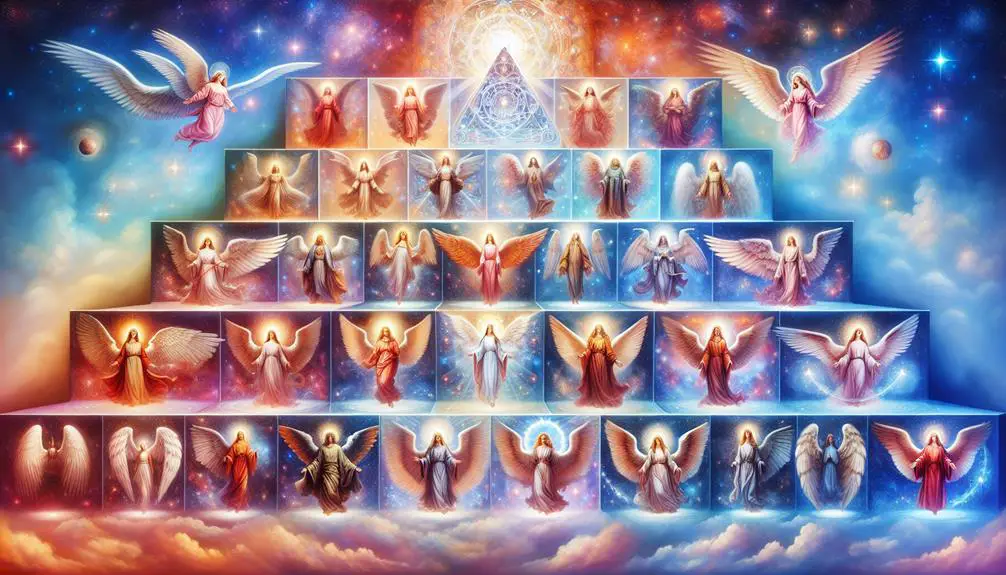
Within the celestial hierarchy, various orders of heavenly beings occupy distinct ranks, each with specific roles and responsibilities designed by the Divine. At the summit of these celestial ranks, you find the Seraphim, known for their close proximity to the throne of God. Their seraphic duties primarily involve the worship and praise of God, reflecting a pure and intense love for the Divine, unmatched by any other beings in the celestial sphere.
Below the Seraphim, other orders such as Cherubim, Thrones, Dominions, Virtues, Powers, Principalities, Archangels, and Angels each contribute uniquely to the cosmic order and the execution of God's will. The Cherubim, for example, guard the sanctity of God's space and presence, offering an additional layer of reverence and awe. The Thrones, on the other hand, serve as the chariots of God, embodying divine justice and authority.
This structured hierarchy underscores a complex, multi-layered system of governance and worship within the heavenly realm. It reveals a divine strategy that assigns specific roles and duties to each celestial rank, ensuring the smooth execution of the Divine plan across the universe. This organization not only highlights the omnipotence and wisdom of the Divine but also the intricate beauty of celestial order.
Divine Messengers and Prophets
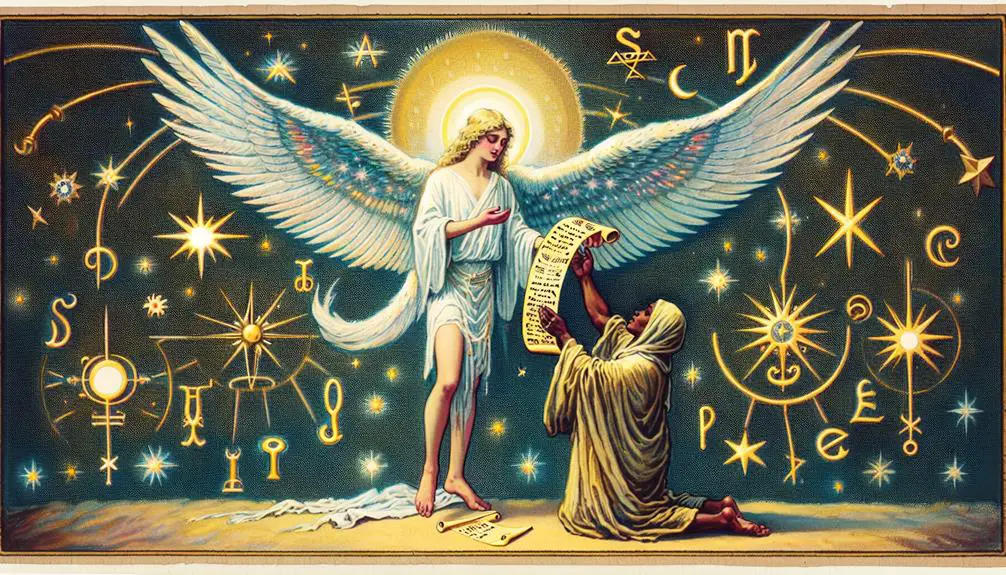
Transitioning from the celestial hierarchy to the realm of human interaction, divine messengers and prophets serve as critical conduits for God's communication with humanity. In the biblical narrative, angelic appearances and the role of prophets are instrumental in revealing God's will, guidance, and warnings to mankind. Their involvement underscores the importance of divine-human interaction in the fulfillment of biblical prophecies and the unfolding of God's plan.
Analyzing the interplay between angelic appearances and prophetic accuracy reveals:
- Angelic beings often appear at pivotal moments, providing guidance or messages directly from God. This underscores their role as divine messengers.
- Prophets, imbued with divine insight, relay messages with remarkable accuracy, pointing to their direct connection with the divine.
- The accuracy of prophecies serves as a testament to the divine origin of the messages, reinforcing the credibility of both the messengers and the prophets.
- Both angelic appearances and prophetic declarations often lead to significant changes or events, highlighting their critical role in the divine narrative.
This dynamic between divine messengers and prophets exemplifies the intricate ways in which God chooses to communicate and interact with humanity, emphasizing the importance of heeding these divine communications.
Guardianship and Protection

Frequently, biblical narratives depict angels as guardians and protectors, assigned by God to safeguard individuals and nations against spiritual and physical adversities. This role underlines the profound angelic empathy and celestial compassion that characterize these beings. They're not merely messengers or divine warriors; they embody the protective love of the Creator, intervening in human affairs to shield the vulnerable and guide the lost.
Angels' guardianship extends beyond physical protection, offering emotional and spiritual support to those facing trials. They act under divine directive, yet their actions reflect a deep understanding of human frailty and the complexities of the spiritual landscape. This duality of strength and empathy showcases their unique position within the biblical narrative as agents of God's protective grace.
Their protective role is also pivotal in demonstrating the interconnectedness of the divine and the mortal realms. Through their guardianship, angels facilitate a deeper understanding of God's omnipresence and omnipotence, reassuring believers of the constant divine watchfulness over their lives. This celestial compassion and guardianship underscore a key aspect of the divine-human relationship, emphasizing trust, reliance, and the ever-present support of the heavenly realm.
Warriors of the Spiritual Realm
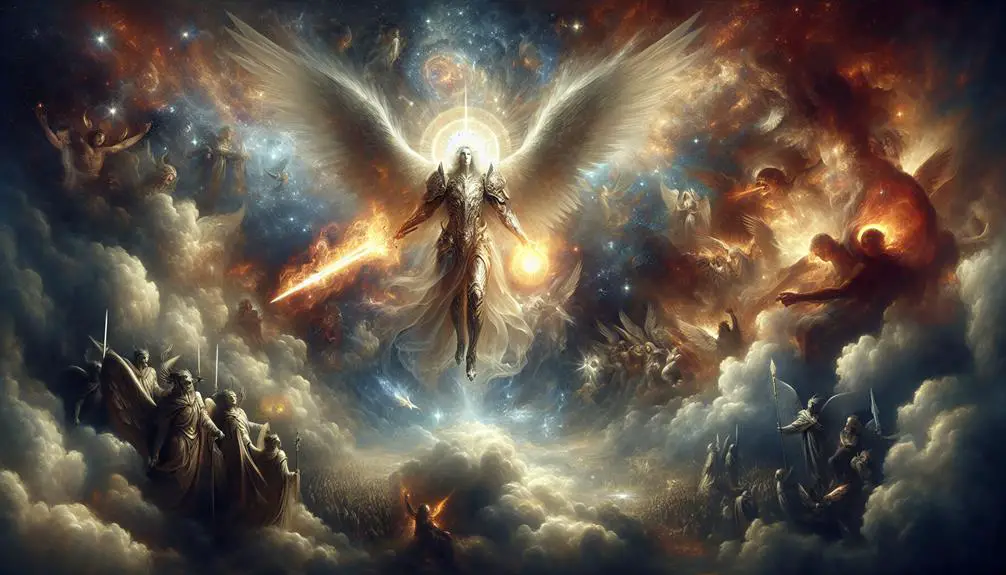
You'll find that angels aren't only messengers and guardians in biblical texts but also formidable warriors in the spiritual realm. Their combat abilities, as depicted in various passages, underscore a multifaceted role in both heaven and earth's battles.
The discussion extends to how guardian angels specifically navigate these spiritual conflicts, safeguarding humanity beyond mere physical protection.
Angelic Combat Abilities
Angelic beings, often depicted as messengers and protectors, also embody formidable combat abilities, positioning them as powerful warriors within the spiritual realm. Their angel attributes and celestial weaponry aren't only symbols of their divine origin but also tools of justice and protection. Analyzing these elements reveals:
- Exceptional Strength: Angels possess physical and spiritual strength far beyond human capabilities.
- Celestial Weaponry: They wield weapons forged in divine essence, capable of vanquishing spiritual adversaries.
- Tactical Wisdom: Their intelligence and strategic insights are honed over millennia, making them adept in the art of celestial warfare.
- Supernatural Abilities: Angels can manipulate elements of creation and harness powers that defy the laws of physics, enabling them to engage in battles unseen by the human eye.
Spiritual Battles Described
Within the biblical narrative, spiritual battles serve as pivotal moments where celestial beings engage in epic confrontations, underscoring the profound impact of such conflicts on both the spiritual and physical worlds.
These narratives reveal not just the might of angels but also the sophisticated celestial strategies employed against demonic adversaries. These strategies aren't merely acts of brute force; they embody complex tactics, signifying a deeper understanding of the cosmic struggle between good and evil.
Analyzing these scriptures, one discerns the meticulous planning and execution of divine plans, where angels act as warriors of the spiritual realm. Their battles, though often invisible, have ramifications that echo throughout existence, influencing outcomes in the human realm.
This intricate depiction of spiritual warfare highlights the pivotal role angels play in executing divine justice and maintaining cosmic balance.
Guardian Angels' Role
Transitioning from the broader context of celestial battles, it's crucial to focus on the specialized role of guardian angels, who serve as dedicated warriors within the spiritual realm. These beings, often shrouded in guardian myths, engage in activities far beyond human comprehension, manifesting both protection and guidance. Their existence and actions hint at the complexity of angelic emotions, challenging simplistic interpretations of their nature.
- Intervention in human affairs, subtly steering individuals away from harm.
- Battles against dark forces, unseen yet crucial for spiritual safety.
- Guidance during critical decisions, providing a sense of divine insight.
- Emotional support in times of need, though angelic emotions remain enigmatic and vastly different from human feelings.
Analyzing these roles reveals a multifaceted understanding of guardian angels, transcending traditional myths and highlighting their profound impact on the spiritual and material worlds.
Miraculous Interventions
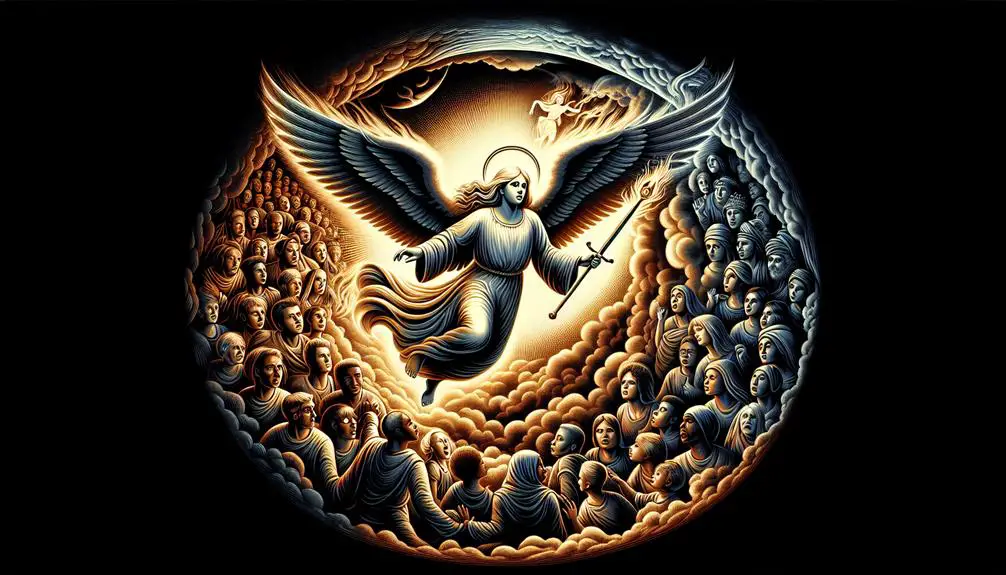
Exploring biblical narratives reveals that angels frequently played crucial roles in miraculous interventions, directly impacting human affairs with divine authority. These angelic appearances often marked significant turning points, embodying supernatural phenomena that defy natural explanations. When you delve into these accounts, you encounter a realm where the boundary between the divine and the mortal blurs, showcasing the immense power vested in these celestial beings.
Angels, acting as God's messengers and executors of His will, have initiated events that altered the course of history and individual destinies alike. Their actions, ranging from delivering prophetic messages to providing guidance or protection, underscore their pivotal role in the divine plan. For instance, the intervention of an angel in saving Abraham's son, Isaac, from being sacrificed, not only tested Abraham's faith but also set a precedent for understanding divine mercy and intervention.
Such instances highlight the multifaceted roles angels assume, acting as intermediaries between God and humanity. Their involvement in human affairs, while miraculous, serves a greater purpose, aligning with divine will and contributing to the fulfillment of biblical prophecies. Through these interventions, angels demonstrate their power, not as independent agents, but as faithful servants executing God's commands, shaping the biblical narrative through their extraordinary acts.
Limitations and Boundaries

You'll find that while angels in the Bible exhibit remarkable abilities, their powers aren't without restrictions. They must adhere to divine command, limiting their interactions with humanity and ensuring their actions align with God's will.
These boundaries underscore the structured hierarchy and purpose within the celestial realm, highlighting angels' roles as servants rather than autonomous entities.
Angelic Obedience Required
Angels, despite their celestial status, are bound by divine mandates that dictate their actions and limit their autonomy. This essential aspect of angel morality ensures their complete alignment with the celestial will, preventing any deviation from their assigned roles. The obedience they exhibit isn't merely a choice but a fundamental requirement of their existence.
- *Angels can't act contrary to God's commands, ensuring a harmonious celestial order.*
- *They lack the freedom to reinterpret or question the divine will, highlighting their unwavering submission.*
- *Their interventions in the earthly realm are strictly regulated, ensuring they fulfill only God's intended purposes.*
- *Any deviation from prescribed duties is absent, showcasing their perfect adherence to divine directives.*
This framework of obedience showcases the complexity and hierarchical nature of celestial beings, emphasizing their role as messengers and executors of a higher will.
Human Interaction Restrictions
Delving into the biblical narrative, it's evident that angels operate within strict boundaries when interacting with humans, a reflection of divine order and purpose. These celestial beings display a range of angel emotions, yet their expressions towards humans are carefully moderated to maintain the integrity of their missions. Interpersonal dynamics between angels and humans are thus highly regulated, ensuring that the interactions don't overstep divinely set limits.
This careful balance highlights the importance of angels adhering to their designated roles without allowing personal feelings to cloud their judgement or actions. The constraints on their interactions serve not only to uphold the celestial hierarchy but also to protect humans from the overwhelming power and knowledge angels possess, maintaining a necessary distance between the divine and the mortal.
Divine Authority Limits
Within the biblical context, divine authority meticulously delineates the limitations and boundaries angels must adhere to, ensuring a structured celestial order. Despite their immense power, angels aren't autonomous beings and operate under strict divine mandates. This framework is necessary to maintain the balance between heavenly and earthly realms.
- Angelic free will is constrained by divine law, preventing them from acting against God's will.
- Divine punishments await those who transgress these celestial boundaries, emphasizing accountability.
- Angels can't override human free will, respecting the sanctity of personal choice.
- Their interventions in the natural world are carefully regulated, ensuring they align with divine purposes.
This structured approach to angelic governance underscores the complexity and hierarchy within the spiritual realm, highlighting the balance between power and obedience.
Influence on Humanity and Earth

Guiding humanity through various means, angels have played a pivotal role in shaping both spiritual and earthly realms according to biblical narratives. An understanding of angelic emotions and human fascination with these celestial beings reveals a complex relationship. Angels are depicted as messengers and protectors, exhibiting traits such as joy and wrath, which mirror the emotional spectrum experienced by humans. This shared emotional capacity bridges the divine-human divide, fostering a deep fascination and reverence towards angels among people.
Their influence extends beyond mere emotional connection; angels have been instrumental in guiding human actions and decisions. Instances in the Bible highlight how angels delivered divine messages, directly impacting human history. For example, their warnings to biblical figures often led to significant changes in direction or attitude, demonstrating their critical role in the unfolding of God's plan for humanity.
Moreover, angels have been involved in executing divine judgment, further underscoring their power and influence on earth. This dual role of guidance and enforcement showcases the breadth of their involvement in both the spiritual and physical domains. Through their actions, angels have significantly shaped the course of human events, underlining their importance in the biblical narrative and their enduring influence on humanity and earth.
Frequently Asked Questions
How Do Different Cultures Outside of Christianity Interpret the Power and Roles of Angels?
In exploring how different cultures interpret angels' power and roles, you'll find Islamic interpretations highlight their significant spiritual roles, acting as messengers and protectors within the Quran.
Meanwhile, Hindu parallels can be seen in divine beings like devas, who, akin to angels, serve the gods and assist in maintaining cosmic order.
Both these perspectives offer a rich, nuanced understanding of celestial beings, diverging from and complementing traditional Christian views.
Can Angels Choose to Disobey or Fall From Grace According to Biblical Texts, and What Are the Consequences?
Imagine a celestial chessboard, where each piece has its own role and power. In this divine game, angels aren't mere pawns but significant players with free will.
According to biblical texts, they can indeed choose to disobey or fall from grace, stepping out of the ordained angel hierarchy. Such actions come with dire consequences, reflecting the gravity of their choices and the balance of cosmic order.
Analyzing these texts reveals a complex structure of divine justice and mercy.
Are There Any Biblical Accounts of Humans Becoming Angels After Their Death?
You might've heard stories or seen depictions of humans becoming angels after death, but according to biblical texts, this isn't supported. The Bible maintains a clear distinction between humans and angels, with no accounts or teachings that humans transition into angels in the afterlife.
This separation underscores prevalent afterlife misconceptions and clarifies the angel hierarchy, emphasizing that angels and humans occupy different roles and destinies in the biblical narrative.
How Do Angels Communicate With God and Do They Have a Unique Language or Method of Communication?
Imagine a vast network where divine messengers, or angels, bridge the gap between heaven and Earth, much like cosmic internet connecting us to the divine.
In this celestial framework, angel linguistics isn't just about words; it's about conveying the essence of God's will. They don't necessarily use a unique language we'd understand but communicate through visions, dreams, and feelings, directly linking their messages to our souls in a profound, unspoken dialogue.
In What Ways Have Depictions of Angels' Power in Popular Media (Movies, Books, Art) Diverged From Their Biblical Descriptions?
In examining how media portrays angels, you'll find significant divergences from their biblical descriptions. Popular media often leans on angel stereotypes, painting them as either ethereal guardians or dark, fallen beings, which contrasts sharply with Scripture.
This divergence highlights a broader trend of media vs. Scripture, where complex biblical narratives are simplified or reimagined to fit contemporary narratives, sometimes at the expense of theological accuracy and depth.
Conclusion
In conclusion, angels in the Bible embody divine power and purpose, serving as messengers, protectors, and warriors. They stand at the nexus of the celestial and terrestrial, bridging heaven and earth, guiding and guarding humanity.
Yet, they operate within divine boundaries, their influence both profound and limited. Analyzing their roles reveals a complex hierarchy and a multifaceted involvement in human affairs, underscoring their significance in the spiritual realm and their enduring impact on earth and beyond.



Sign up